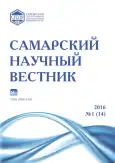Истоки возникновения понятия «вкус» как основа формирования художественного вкуса у студентов творческих специальностей в процессе их профессиональной подготовки
- Авторы: Бирюков М.Ю.1
-
Учреждения:
- Луганский государственный университет имени Тараса Шевченко
- Выпуск: Том 5, № 1 (2016)
- Страницы: 137-142
- Раздел: 13.00.00 – педагогические науки
- URL: https://bakhtiniada.ru/2309-4370/article/view/22025
- DOI: https://doi.org/10.17816/snv20161302
- ID: 22025
Цитировать
Полный текст
Аннотация
Воплощение принципов демократии, гуманистических приоритетов в высшее профессиональное образование определяет глубокие изменения в сфере формирования художественного вкуса современной молодежи. Проблема развития и формирования художественного вкуса личности является сложной, неоднозначной и исследуется представителями разных наук. В художественном вкусе сфокусированы критерии эстетической оценки всех сфер жизнедеятельности человека, он выступает в качестве инвариантной основы для создания личностно-уникальных форм поведения, мышления и творческой деятельности личности. В статье рассматриваются история, состояние и значение художественного вкуса в формировании личности человека в исторической и современной науке, выделяются субъективные и объективные взгляды на условия существования и формирования художественного вкуса, подается собственное определение художественного вкуса на современном этапе развития общества. Разнообразие художественных вкусов, обусловлено неограниченным богатством самих художественных объектов, которые существуют в действительности, а также постоянным развитием действительности – и, прежде всего, социальной действительности – появлением новых условий жизни, совершенствованием человека и изготовленных им предметов. Вопрос о разнообразии художественных вкусов находит свое решение, прежде всего, уже при рассмотрении объективности их содержания; многообразие конкретных проявлений красоты предполагает и разнообразие вкусовых предпочтений. Индивидуализированное проявление художественного вкуса ценно тем, что демонстрирует нюансы качеств объекта и позволяет передать другим чувство, пережитое личностью. Следовательно, создаются основания для творчества в оценочно-переживающих взаимодействиях, поэтому художественный вкус служит эффективным средством эстетического воспитания студентов художественных специальностей в процессе профессиональной подготовки.
Полный текст
Открыть статью на сайте журналаОб авторах
Михаил Юрьевич Бирюков
Луганский государственный университет имени Тараса Шевченко
Автор, ответственный за переписку.
Email: birukovmu@rambler.ru
доцент кафедры дизайна и проектных технологий
Украина, ЛуганскСписок литературы
- Об образовании в Российской федерации: федер. закон № 273-ФЗ от 29.12.2012: по сост. на 01.09.2013. URL: http://www.zakonrf.info/zakon-ob-obrazovanii-v-rf.
- Закон України «Про вищу освіту» № 1556-VII: остання редакція від 01.01.2015. URL: http://docs.dtkt. ua/ua/doc/1204.353.0 (дата обращения: 19.06.2015).
- Эстетика: словарь / под общ. ред. А.А. Беляева и др. М.: Политиздат, 1989. 447 с.
- История эстетики: памятники мировой эстетич. мысли: в 7 т. / гл. ред. М.Ф. Овсянников. М.: Искусство, 1962. Т. 2: Эстетические учения XVII-XVIII веков. 1964. 835 с.
- Мастера искусства об искусстве: избр. отрывки из писем, дневников, речей и трактатов : в 7 т. / под. общ. ред. А.А. Губера. М.: Искусство, 1965. Т. 5: Искусство конца ХIX - начала XX века. / под ред. И.Л. Маца и Н.В. Яворской. 1969. Кн. 2. 541 с.
- Локк Д. Избранные философские произведения: в 2 т. М.: Соцэкгиз, 1960 Т. 1: [Опыт о человеческом разуме]. 1960. 734 с.
- Лосев А.Ф., Шестаков В.П. История эстетических категорий. М.: Искусство, 1965. 374 с.
- Чернышевский Н.Г. Статьи по эстетике. М.: Соцэкгиз, 1938. 316 с.
- Хатчесон Ф., Юм Д., Смит А. Эстетика. М.: Искусство, 1973. 478 с.
- Руссо Ж.-Ж. Об искусстве: ст. высказывания, отрывки из произведений / пер. с фр. и вступ. ст. Т.Э. Барской. Л.; М.: Искусство, 1959. 296 с.
- Кант И. Сочинения: в 6 т. М.: Мысль, 1964. Т. 5: Сочинения по эстетике: критика способности суждения / под общ. ред. В.Ф. Асмуса, А.В. Гулыги, Т.И. Ойзермана. 1964. 543 с.
- Столович Л.Н. Природа эстетической ценности. М.: Политиздат, 1972. 272 с.
Дополнительные файлы






